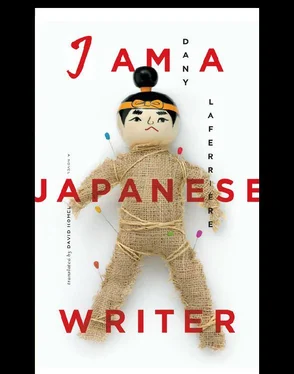Dany Laferriere
I Am a Japanese Writer
The beginning of all art
in the deep north
a rice-planting song
BASHO
FOR everyone who would
like to be someone else
MY PUBLISHER CALLED while I was out buying fresh salmon. He wanted to know what was going on with that damned book. I’d rather talk salmon. Once, I couldn’t stand the stuff. I ate it and ten minutes later I was puking. The last time was at a friend’s place. I missed the bowl in her bathroom. I cleaned up the floor, washed my face and went back to the living room. I swore it was the last time I’d eat it. Okay, it’s not the first promise I haven’t kept. I am under no obligation to keep promises I make to myself — except the one to write this book. My publisher’s voice was acid despite all the sweetness he was trying to put into it. I can understand him. He didn’t exactly twist my arm to get me to do this book. I’d started nodding my head as hard as I could when he told me I absolutely had to write a new book. The word “new” has always frightened me a little. Why a new book? After all this time, we should know there’s nothing new under the sun. But we keep on trying. The customer always wants something new and different. I wasn’t about to get into that discussion; he knows it by heart, anyway. We talk about it every time we meet. The setting: his tiny office (one day someone will have to drag him out of there, from under the multicolored manuscripts and red books) or one of the neighborhood cafés. He’s a tall young man with eyes like globes and a disarming smile. He has a habit of running his hands through his hair, as if to brush away the clouds that have gathered there.
We hadn’t even got to the café and I’d already found the title. I’m good at titles. Kurt Vonnegut Jr. apparently told his wife, who told me (I’m talking like a journalist now), that I was the fastest “titler” in America. The fastest titler in America, sure, why not, but I wouldn’t have minded knowing in what context he said that. Vonnegut was always out of context. That was his specialty. Do we really need a context to be the breakfast of champions? Billy the Kid: the fastest gun in the West. No need for a context there. The description is complete and autonomous. Even the tone is there. Had he said it ironically? His wife didn’t elaborate. It’s like saying that’s all I’m good at— with me, don’t bother going past the title. I guess that’s better than a bad title that keeps you from reading further. You can’t imagine the number of good books that are read clandestinely because of their bad titles. In bookstores, of the rare comments I hear about a book, 90 percent are about the title. Readers often ask me how I find my titles. I really don’t know. I just sit there for a while, and suddenly the title comes to me. This time I didn’t even need ten seconds; the title was there, waiting for me at the next corner. Are you looking for a title? How did you guess? It leaped at me and stretched out on the white sheet of paper. I need to contemplate a title, to turn it every which way. Each word — no — each syllable, each letter has to be in the right spot. Whatever the book is, these words will represent it. These are the words people will see most often. For the others, they’ll have to open the cover, while these words will always be there, before our eyes. They’ll contain all the other words in the book. You don’t have to reread García Márquez’s book; all you have to do is say One Hundred Years of Solitude or Remembrance of Things Past if we’re talking about Proust (do we even have to mention his name? Doesn’t everyone recognize the title?), and all the images in the book pass before our delighted eyes like a curtain of light separating us from unpleasant reality. The time we spent reading it (the days at the café, the nights by lamplight), hidden in the folds of our memory, rise to the surface with their rich parade of unnameable sensations. A good title is a fabulous password!
When you put forward a title you like, you have to be careful. In general, publishers want to hear about the content. What is it all about? They ask stupid questions like that. But not my publisher: he leaned back from the table, a smile on his lips. I used the moment to scan some of the titles on the shelves. Nothing worthwhile there. So I casually sent mine over the heaps of manuscripts. What was it? I Am a Japanese Writer. A brief silence. Then a wide smile. Sold! We signed the contract: ten thousand euros for five little words. In my euphoria, I told the Vonnegut anecdote to my publisher. He could already picture the promo copy: “The fastest titler in America.” But we dropped the idea — too immodest. That’s the problem with Westerners: we’re too afraid of ridicule. Being ridiculous won’t kill us, but the fear of it will. The other reason we dropped the slogan was the ambiguity of the word “titler.” Most readers would have read it as “tattler” or “titter.” So really, we lacked courage. But let’s get back to the title itself. He took it in his hands as if it were a lighter in a no-smoking area. He weighed and measured it. My title passed every test. He began writing it on the nearest piece of paper. It was pretty banal, actually — except for the word “Japanese.” And that was no joke: I really do consider myself a Japanese writer.
WHEN YOU’VE GOT the title, most of the job is done. Still, you do have to write the book. There’s no getting around it. I am still swimming between the title and the book. Floating. Taking the time to measure the distance to be traveled. I’m never in a hurry to get to the heart of the matter. In my head, I run through the images I’d like to see in the book. It’s important to get them to enter into your flesh, to mix with your blood, so that you can practically write with your feet — in other words, without thinking. It’s not easy to change an idea into emotion. You’re impatient, but these things take time. Time cares little for our impatience. The result is a kind of generalized anxiety that follows you everywhere, even to the fish store. The problem is, you’re not sure what that kind of monster feeds on. So you take your time. You sit on a park bench and watch the clouds go by. You watch with pleasure as a little girl plays with her dog. You examine the sky with its low belly, heavy with black storm clouds. Pretty soon you start wanting to open up that belly and see if it feeds off anxieties or images. You linger there, in a state of expectancy. Open. Anything can enter. A moment of perfect calm. You sniff the air in wonderment as a single dry leaf falls from a tree. The time that came before seems so carefree now. Nasty weather this morning. You look at people but don’t see them. You listen to them but don’t hear them. You give too much importance to small details. But what if everything begins with that detail? You take a number and join the line at the fish store. You’ve stopped listening to the people talking to you, but you’ve started paying close attention to the ones who aren’t speaking to you. You’re preparing to become everyone else.
The fishman, a Greek, touches my forearm as he hands me my salmon, skillfully wrapped in brown paper.
“Are you going to write a second book?”
I’ve written fourteen books, but he’s still stuck on the first. Twenty years have passed and he still asks me the same question. He’s not interested in my answer. On to the next customer.
On my way out, just to gauge his reaction, I tell him, “I am a Japanese writer.”
His eyes cut back to me.
Читать дальше












